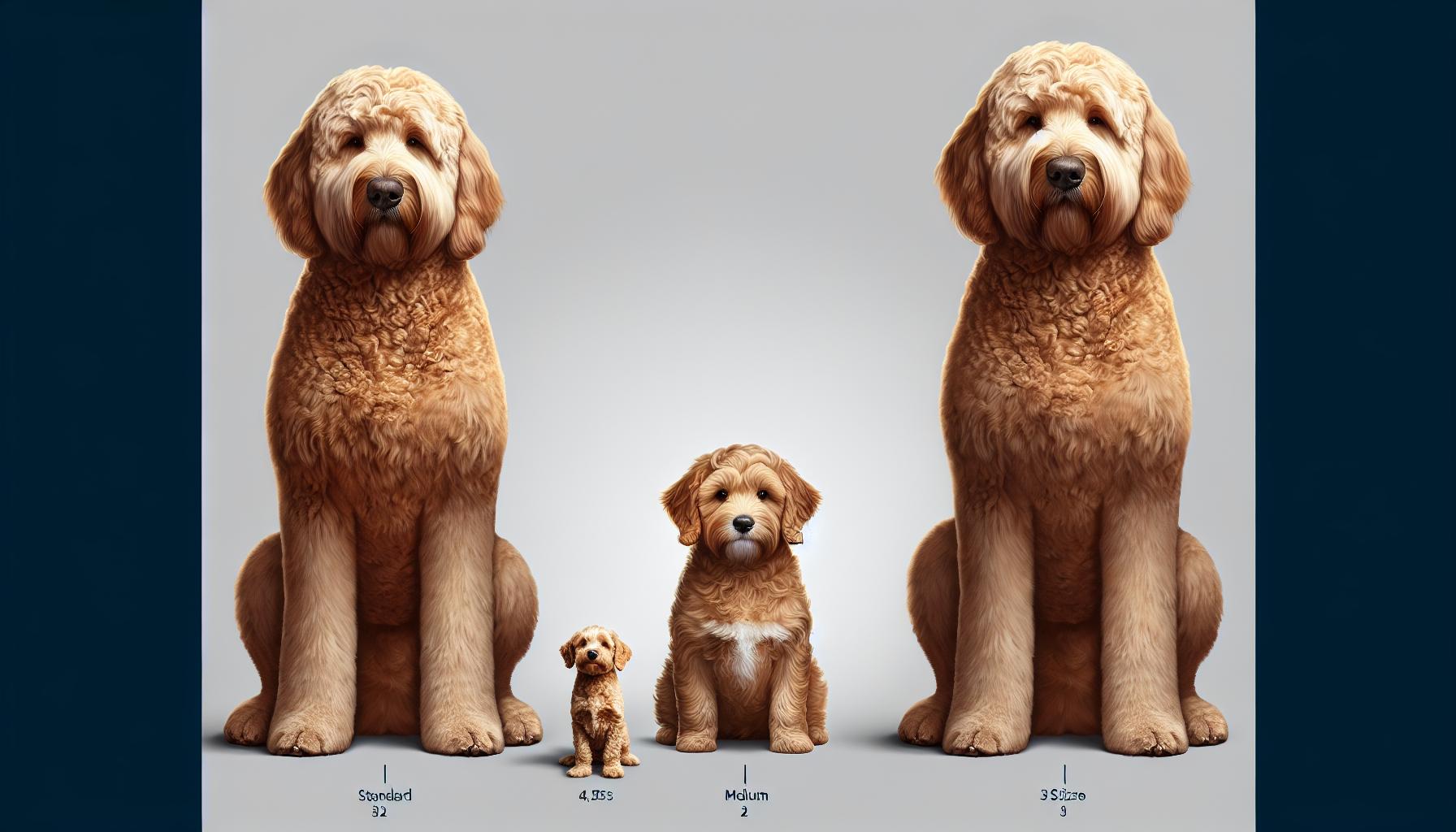Goldendoodles, the adorable mix between Golden Retrievers and Poodles, have captured the hearts of many with their charming looks and affectionate personalities. But before bringing one of these furry friends into your home, it’s essential to understand their lifespan and what factors contribute to their longevity.
Typically, Goldendoodles enjoy a life expectancy of around 10 to 15 years. This range, however, can be influenced by various factors, including their health, size, and the care they receive. They’re known for being relatively healthy, but like all breeds, they have their susceptibilities.
Table of Contents

Knowing the average lifespan of a Goldendoodle is crucial for potential and current owners alike. It helps in preparing for a long-term commitment to ensure these loving pets live a full, happy life. Let’s delve into what impacts a Goldendoodle’s life expectancy and how you can help yours thrive.
Factors That Influence the Lifespan of Goldendoodles
When considering the longevity of Goldendoodles, several factors come into play that can significantly impact their lifespan. These dogs are a mix between Golden Retrievers and Poodles, each breed carrying its own genetic traits.
Size is a critical factor; larger dogs tend to have shorter lifespans than smaller ones. Goldendoodles come in various sizes, including standard, medium, and miniature. The smaller ones usually live longer because they are less prone to physical stress and genetic diseases that often affect larger breeds.
Another key element is healthcare and prevention. Ensuring that Goldendoodles receive regular check-ups with a veterinarian can lead to early detection and treatment of potential health issues. Vaccinations and parasite control play a crucial role in preventing diseases that can decrease their lifespan. Dental health, often overlooked, is also a significant factor as poor dental hygiene can lead to systemic health problems.
The diet of a Goldendoodle profoundly affects its overall health and longevity. Feeding them a balanced diet rich in essential nutrients helps maintain a healthy weight and supports their immune system. Obesity is a known risk factor for various diseases and can reduce a dog’s life expectancy. Owners are encouraged to consult with their vet to identify the best diet for their Goldendoodle’s age, size, and activity level.
Physical exercise and mental stimulation cannot be understated. An active lifestyle prevents obesity and related health issues, and it also contributes to their mental health. Goldendoodles are intelligent and active dogs that thrive on engagement and challenges.
Environment and lifestyle choices also contribute to a Goldendoodle’s lifespan. Exposure to harmful substances, stress, and an inactive lifestyle can take their toll. Conversely, a loving environment that provides safety, regular physical activity, and mental stimulation will support longer and healthier lives.
Each of these components shapes the longevity of a Goldendoodle. Optimal care involving regular vet visits, a proper diet, adequate exercise, and a safe and loving environment are keys to maximizing their lifespan. Owners should recognize the importance of these factors and their role in their Goldendoodles’ lives.
Health Factors to Consider for Longevity

When looking to extend the lifespan of a Goldendoodle, health factors take center stage. These dogs can be predisposed to certain hereditary conditions, which owners should monitor with the help of a veterinarian.
Regular Veterinary Care is essential for catching issues early. Early detection of common Goldendoodle ailments such as hip dysplasia, ear infections, or genetic conditions like von Willebrand’s Disease can significantly improve outcomes. Scheduled check-ups enable vets to monitor the dog’s health over time and provide necessary interventions.
Vaccinations and Preventative Medications also contribute to the overall wellbeing of Goldendoodles. Protecting them from parasites like fleas, ticks, and heartworms, along with staying up to date on shots, establishes a foundation for a healthy life.
Nutrition can’t be overlooked when it comes to health and longevity. A balanced diet formulated for their specific life stage supports organ health and energy levels. Owners should opt for high-quality dog food that meets all nutritional needs and consider any special diets if allergies or sensitivities are present.
Physical fitness goes hand in hand with dietary health. Goldendoodles require regular Physical Exercise to keep their cardiovascular health in check and to prevent obesity, which can lead to a host of other health problems. Similarly, mental stimulation is key; it keeps their minds sharp and can ward off cognitive decline as they age.
Lastly, owners should be aware of their pet’s Mental Well-being. A Goldendoodle’s mental state can significantly impact its physical health. Anxiety and stress can manifest in destructive behaviors and can even have physiological effects. Providing a stable, loving environment with plenty of enrichment activities is vital for their mental and emotional health.
Owners committed to their Goldendoodle’s long-term health will see the benefits in their companionship for years to come. Each factor, from diet to the home environment, intertwines to form the tapestry of care that is crucial for the longevity of these affectionate dogs.
Size and Its Impact on Lifespan

The average lifespan of a Goldendoodle can be significantly influenced by its size. Goldendoodles come in three main sizes: standard, medium, and miniature. These classifications are based on their adult weight, with standard Goldendoodles typically weighing more than 50 pounds, medium Goldendoodles between 30 to 50 pounds, and miniature Goldendoodles weighing between 15 to 30 pounds.
Researchers have found a curious inverse correlation between the size of a dog and its lifespan. Generally, smaller dogs tend to live longer than larger ones. This trend holds true for Goldendoodles as well. Miniature Goldendoodles often outlive their standard counterparts, which is an important consideration for potential owners.
- Standard Goldendoodles: 10 – 12 years
- Medium Goldendoodles: 12 – 14 years
- Miniature Goldendoodles: 14 – 16 years
Several factors contribute to this size-lifespan relationship. Larger dogs grow at a faster rate which can lead to more developmental disorders and put a strain on their musculoskeletal system. This rapid growth period might also bring about early onset of age-related diseases. Furthermore, the metabolic rates of larger dogs are believed to affect their aging processes.
It’s also vital for owners to recognize that individual health and environmental factors can greatly affect a Goldendoodle’s life expectancy, regardless of size. These factors may include:
- Genetic heritage
- Diet quality
- Exercise frequency
- Health care and prevention strategies
Regular veterinary check-ups play a critical role in identifying and managing any health issues that may arise. By addressing problems early, owners can better maintain their Goldendoodle’s health, which can positively influence their lifespan. Moreover, a balanced diet and regular exercise can help these dogs maintain a healthy weight, reducing the risk of obesity-related health issues.
Understanding the influence of size on lifespan empowers Goldendoodle owners to take proactive steps in caring for their pets. Tailoring diet, exercise routines, and health care plans with considerations to the dog’s size can help ensure these beloved canines enjoy a full and vibrant life.
The Role of Nutrition in a Goldendoodle’s Lifespan
Nutrition plays a critical role in the health and longevity of Goldendoodles. Providing a balanced diet tailored to their specific stage of life is essential for supporting their growth, metabolism, and immune system. Puppies, adults, and senior Goldendoodles have different nutritional requirements. High-quality dog food that meets the Association of American Feed Control Officials (AAFCO) guidelines ensures your pet gets the necessary nutrients.
Tailored Diets for Every Life Stage
- Puppies need more protein and calories to support rapid growth.
- Adults require a well-balanced diet to maintain optimal weight and health.
- Seniors benefit from lower-calorie diets to prevent obesity, with added joint support and fiber.
It’s important to adjust portion sizes and feeding frequencies according to their activity levels and weight goals. Overfeeding can lead to obesity, which is a known risk factor for many health issues in Goldendoodles.
Quality of Ingredients
Selecting foods with high-quality proteins, whole grains, and fresh vegetables can greatly impact a Goldendoodle’s overall health. Foods rich in antioxidants and omega-3 fatty acids are beneficial for cognitive function and skin health. Avoid foods with excessive fillers, additives, or by-products which offer little nutritional value and may even cause digestive issues.
Regularly assessing the dog’s body condition and consulting with a veterinarian can help inform proper diet adjustments. Monitoring for any signs of food allergies or intolerances is also crucial as these can affect a dog’s health and its lifespan. Tailoring nutrition and being responsive to dietary needs can significantly enhance a Goldendoodle’s quality of life and potentially extend their years.
Exercise and Mental Stimulation for a Longer Life

Goldendoodles are known for their energetic and affectionate nature, making exercise and mental stimulation critical components of their health regimen. Regular physical activity not only keeps their muscles toned and their heart healthy but also helps manage their energy levels, reducing the risk of behavior problems which can stem from boredom or excess energy.
Daily exercise, such as walks, runs, or playtime in a secure area, is essential. The appropriate amount of exercise for a Goldendoodle will vary depending on their age, size, and individual health needs but typically ranges from 30 minutes to an hour per day. Vigorous play sessions coupled with more relaxing walks provide a balanced routine that caters to both their physical and mental well-being.
Mental stimulation is just as important as physical exercise. These intelligent dogs thrive on challenges and need mental engagement to stay happy. Puzzle toys, training sessions, and new tricks serve to keep their minds sharp and engaged.
- Enrichment activities might include:
In addition to structured play and training, social interaction is key to keeping a Goldendoodle mentally stimulated. Whether it’s a play date with other dogs or simply spending quality time with family members, these interactions contribute to a Goldendoodle’s emotional health.
The benefits of physical and mental stimulation are evident in a Goldendoodle’s disposition and physical condition. An active lifestyle may have a significant impact on a Goldendoodle’s longevity by preventing obesity, a major health concern that can shorten a dog’s life. Regular vet visits can help owners tailor an exercise and mental engagement schedule that aligns with their Goldendoodle’s health status, ensuring they get the most out of their activities without overexertion. Keeping a Goldendoodle active and mentally engaged can lead to a more fulfilled, healthier life, potentially extending their average lifespan.
Common Health Issues in Goldendoodles
Goldendoodles are generally healthy, but like all breeds, they’re prone to certain health conditions. Being aware of these common issues is essential for owners looking to maintain their pet’s health and extend their lifespan.
Hip Dysplasia is a well-known inherited condition that can affect Goldendoodles. This malformation of the hip joint can lead to pain, arthritis, and mobility challenges as the dog ages. Early detection through regular veterinary check-ups can lead to better management of this condition.
The breed can also suffer from Elbow Dysplasia, another joint-related condition. Similar to hip dysplasia, it can cause joint pain and may lead to arthritis. Maintaining a healthy weight and appropriate exercise can be beneficial in managing symptoms.
Von Willebrand’s Disease, a blood disorder that affects the clotting process, is another concern for Goldendoodle owners. Dogs with this condition may experience excessive bleeding from minor injuries or surgeries. It’s important for veterinarians to be aware of the breed’s predisposition to this disorder, especially prior to surgical procedures.
Ear Infections are common due to the breed’s floppy ears, which can trap moisture and lead to bacterial growth. Regular ear cleaning and monitoring for signs of infection can prevent more serious complications.
Allergies are another common issue in Goldendoodles, manifesting through skin irritations and itchiness. Identifying and removing the allergen is crucial for providing relief. Often, changes in diet or environment are effective solutions.
Lastly, Addison’s Disease — an endocrine disorder where the adrenal glands produce insufficient hormones — is something to watch for. Symptoms can be nonspecific but may include lethargy, vomiting, and weight loss. Hormonal therapy is often required to manage this condition.
Routine health checks and a close relationship with a trusted veterinarian will help identify and treat these issues, contributing to a Goldendoodle’s healthy life. Monitoring dogs for these common health issues is a proactive step toward preserving their vitality.
Tips for Helping Your Goldendoodle Live a Longer Life
Keeping a Goldendoodle healthy and potentially extending its life involves several proactive steps. Regular veterinary care is one of the cornerstones of a long and healthy life for any dog breed. Yearly check-ups can catch potential health problems early, and vaccinations keep dangerous diseases at bay. For Goldendoodles, routine screenings for common breed-specific conditions are recommended.
In addition to medical care, dental hygiene plays a pivotal role in a Goldendoodle’s health. Neglecting dental care can lead to periodontal disease, which has been linked to heart problems and other serious health issues. Brushing their teeth several times per week or providing them with dental chews can help prevent these problems.
Nutrition, as previously mentioned, remains critical throughout a Goldendoodle’s life. Owners should:
- Opt for high-quality dog food
- Adjust portions to avoid obesity
- Monitor treat intake
Owners shouldn’t overlook the value of mental health for their Goldendoodle’s well-being. Dogs that are bored or anxious can develop destructive behaviors and stress-related health issues. Mental stimulation through:
- Interactive toys
- Training sessions
- Regular socialization
can keep them engaged and happy.
Lastly, a consistent grooming routine prevents skin conditions, matting, and issues with the Goldendoodle’s coat that can lead to discomfort or infection. Given that Goldendoodles can inherit a range of fur types, the right grooming tools and techniques for their specific coat should be used.
Exercise, as previously detailed, cannot be overstated. It maintains a healthy weight, keeps the Goldendoodle’s joints healthy, and enhances their quality of life. Regular, age-appropriate exercise should be a part of their daily routine.
Owners can weave all these aspects into their Goldendoodle’s routine with relative ease, setting the framework for a happy, healthier, and potentially extended life for their furry companion.
Frequently Asked Questions
What factors influence the lifespan of Goldendoodles?
The lifespan of Goldendoodles is influenced by several factors including nutrition, exercise, mental stimulation, regular veterinary care, dental hygiene, and grooming. A balanced diet tailored to their life stage, proper healthcare, and an active lifestyle play pivotal roles.
How important is diet to a Goldendoodle’s health?
Diet is crucial to a Goldendoodle’s health. Providing a high-quality dog food that’s appropriate for the dog’s age and health condition helps ensure they receive the necessary nutrients for a healthy life.
What role does exercise play in the health of Goldendoodles?
Exercise is vital for maintaining a Goldendoodle’s physical health and mental well-being. Regular physical activity helps prevent obesity, supports healthy cardiovascular function, and can reduce behavioral problems.
Why is mental stimulation important for Goldendoodles?
Mental stimulation is important for keeping a Goldendoodle’s mind active and engaged, which can prevent boredom and destructive behaviors. It also contributes to their overall happiness and well-being.
How can regular veterinary care extend a Goldendoodle’s lifespan?
Regular veterinary care can extend a Goldendoodle’s lifespan by providing preventative care, early detection and treatment of diseases, and professional guidance on the dog’s healthcare needs.
What impact does dental hygiene have on a Goldendoodle’s health?
Dental hygiene has a significant impact on a Goldendoodle’s health. Poor dental health can lead to serious systemic issues, including heart, liver, and kidney problems, which can shorten a dog’s life.
Can grooming affect a Goldendoodle’s longevity?
Yes, grooming can affect a Goldendoodle’s longevity by preventing skin infections, matting, and other potential health issues. Regular grooming keeps the dog comfortable and may assist in early detection of health concerns.



